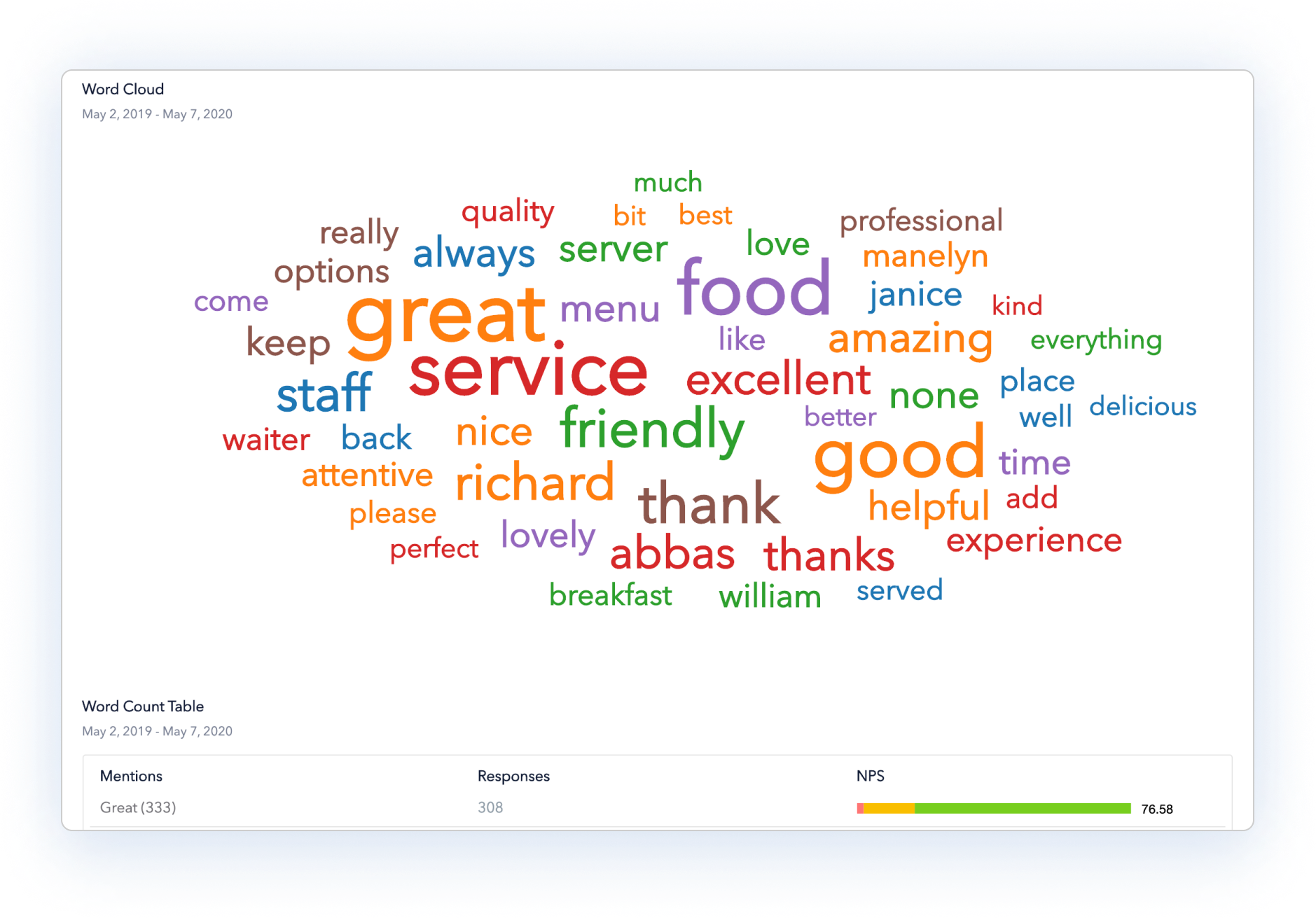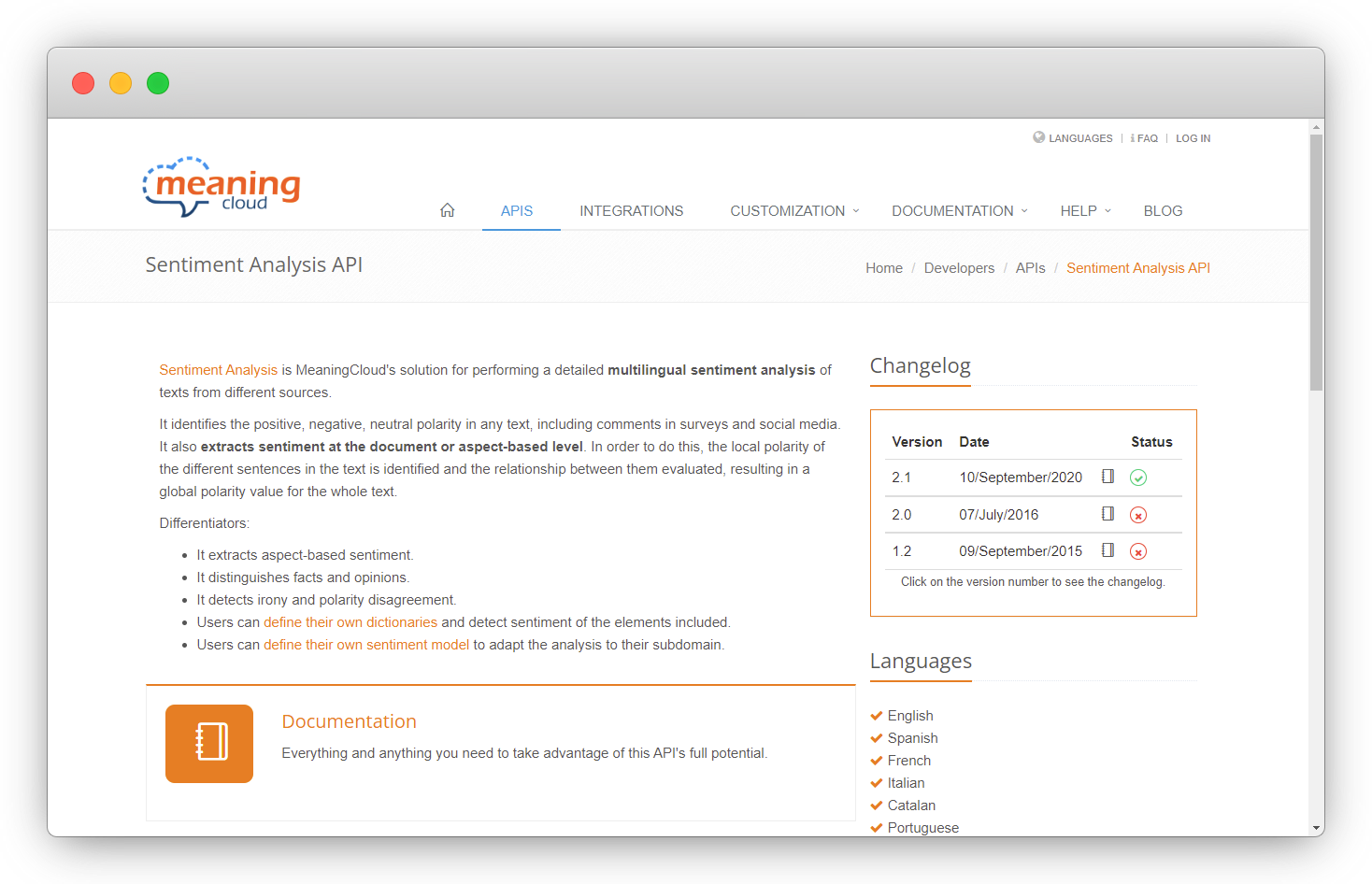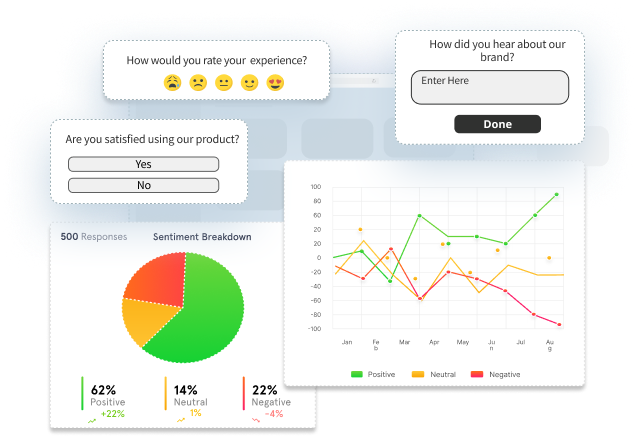Data isn’t your problem. Decoding it is!
80% of all enterprise data is unstructured—think customer emails, open-ended survey responses, social media mentions, chat transcripts, and product reviews. And while this text holds powerful business signals, most organizations barely scratch the surface of it.
That’s where text analysis tools step in—not just to clean up the noise, but to decode meaning, sentiment, urgency, and emerging trends hidden in customer conversations. Whether you're leading CX, product, support, or strategy—across any industry—tapping into this data isn’t just valuable—it’s now a competitive necessity.
The new wave of text analysis doesn’t just interpret what customers are saying—it helps you predict churn, prioritize product enhancements, and even optimize frontline performance. It's about turning passive feedback into powerful strategy.
In this blog, we’ll explore the best text analysis tools available today, their standout features, pros and cons, and ideal use cases to help you choose the perfect fit for your needs. If you're looking to transform unstructured data into business intelligence, you're in the right place. Let's get started!
TL;DR
-
Text analytics tools use NLP and machine learning to analyze text data such as customer feedback, surveys, and reviews, for extracting insights on meaning, sentiment, and context.
-
They turn unstructured data into actionable gold by identifying issues, trends, and sentiments to enhance products, services, customer experiences, monitor brands, conduct market research, and create competitor strategies.
-
We have shortlisted the top 20 text analysis tools catering to diverse needs like comprehensive feedback analysis, product insights, academic research, and more.
-
The list includes software such as Zonka Feedback's no-code AI survey analysis, Enterpret’s feature-level insights, Chattermill’s unified CX intelligence among others.
- Zonka Feedback offers a powerful AI-driven engine to fuel its text analysis software. You can schedule a free demo to learn more about our product from our team of experts.
Turn Customer Feedback Into Actionable Insights
With Text Analytics Software, extract insights from unstructured data and understand your customers better.

If you’re ready to dive into our top picks, here's our list of the best Text analysis tools for quick recommendations, or keep reading to learn about them.
What is Text Analysis?
Text analysis, often called text mining or text analytics, is the process of analyzing and extracting actionable insights from unstructured text data. Unstructured text data can come from a variety of sources, such as feedback, call logs, emails, social media, community discussions, customer reviews, and more.
By using clever computer programs like Natural Language Processing and Machine Algorithms, text analysis can reveal patterns and connections that you might miss on your own. This lets you understand what people are saying, what they care about, and even how they're feeling.
💡According to Gartner, "Text analytics is the process of deriving information from text sources. It is used for several purposes, such as: summarization (trying to find the key content across a larger body of information or a single document), sentiment analysis (what is the nature of commentary on an issue), explicative (what is driving that commentary), investigative (what are the particular cases of a specific issue) and classification (what subject or what key content pieces does the text talk about)."
What are Text Analysis Tools & Software?
Gone are the days when businesses would sit in large groups, have the customer feedback on paper, and analyze what the reviewer meant. Now, several tools allow the automatic analysis of unstructured data and convert it into insights.
Think of them as the translators between messy human language and clear, actionable business insight.
These tools don’t just read text—they understand it. Whether it's a frustrated NPS comment, a glowing review, or a support chat full of nuance, text analysis software breaks it all down:
- What’s being said?
- How does the customer feel about it?
- Is this an isolated issue or part of a trend?
- And most importantly—what should your team do next?
The best part? You don’t need to manually tag or sort through every comment anymore. These platforms use AI, NLP, and smart automations to:
- Detect sentiment (positive, negative, neutral, or mixed)
- Identify recurring themes, pain points, and keywords
- Surface anomalies or urgent flags (think: “refund,” “cancel,” “broken”)
- Categorize feedback by topic, channel, or customer type
In short, text analysis tools make sense of the chaos—so you can stop guessing and start acting. Some tools are built for customer feedback. Others help product teams uncover feature gaps. Some are made for researchers, and a few are powerful enough to do all of the above.
Why Text Analysis Software are Non-Negotiable for 2025?
2025 isn’t about listening harder—it’s about acting smarter. Customer experience, product innovation, and operational efficiency are no longer driven by isolated metrics or delayed feedback loops. They’re powered by systems that can pinpoint intent, detect friction, and surface blind spots in real time.
And that’s exactly where text analysis software earns its seat at the decision-making table. Here’s what’s shifted—and why it matters now more than ever:
- Traditional analytics can’t keep up with nuance. Dashboards may show the “what,” but they rarely explain the “why.” Text analysis fills that gap by surfacing intent and urgency buried deep in unstructured feedback.
- Forecasting is now-focused. Today’s leaders need to spot issues before they show up as churn or bad press. Text analytics enables that foresight—from recurring drop-off complaints to missed SLAs.
- AI is operational, not experimental. In 2025, NLP tools are advanced enough to interpret tone, emotion, and behavioral signals with business-ready precision.
- Speed-to-insight is a competitive advantage. According to Forrester, companies that act on feedback within 48 hours see 3x higher retention rates. That kind of responsiveness demands real-time text analysis—not weekly summaries.
keep in mind that modern feedback intelligence looks like: live, contextual, and action-ready. And the companies leveraging it aren’t just tracking experience—they’re shaping it.
Key Features to Look For in Text Analysis Tools
If you're collecting customer feedback at any meaningful scale, basic sentiment detection isn’t enough. Your text analysis software should take the manual load off your team, streamline messy data, and give you a clear signal on where to focus. Here are the foundational features every modern text analysis tool must include:
- Sentiment Analysis: At the very least, your text analysis tool should tell you how people feel—positive, negative, or neutral. But more importantly, it should detect tone shifts across conversations so you’re not reacting too late.
- Theme & Keyword Detection: You shouldn’t be reading every single response to figure out what’s trending. Your text analytics tool should auto-group related topics and flag common keywords—so you always know what’s bubbling up.
- Channel-Based Categorization: Whether it’s from surveys, reviews, chats, or emails—your feedback should be sorted by source. It helps teams trace issues back to their origin and solve them faster.
- Custom Labels & Tags: Your organization has its own language. Your text analysis tool should let you tag, group, and filter responses based on your internal workflows—not force you to adapt to rigid categories.
- Multi-Source Data Ingestion: Your customers don’t just give feedback in one place—and your text analytics tool shouldn’t either. Look for seamless integrations across platforms like Zendesk, Intercom, WhatsApp, and your CRM.
- Digestible Dashboards: Not every team needs a full report. Executives want the big picture, while analysts need granularity. Your text analysis software should deliver insights in a format that fits both.
Advanced Features that Some Text Analytics Tools Offer
If you're overseeing CX across locations, managing VoC for multiple departments, or scaling insights across thousands of responses per week—your text analysis software needs to do more than summarize. It needs to clarify, assign, and drive action across the business. Here are some advanced features that separate true intelligence from just another dashboard:
- Entity Mapping: Feedback shouldn’t get lost in inboxes or spreadsheets. Look for text analysis tools that automatically assign each response to the right team, agent, location, or product—so accountability is built in, and no issue gets missed.
- Thematic Intelligence: Keywords help, but they’re not enough. Your text analytics tool should group responses into AI-generated themes and sub-themes, giving you structured clarity across product, ops, and support—without the manual effort.
- Prescriptive AI (a.k.a. Agentic AI): Knowing what changed is good. Knowing what to do next is better. The right survey software surfaces performance shifts, priority alerts, and actionable suggestions—so insights move from passive to proactive.
- Smart Role-Based Dashboards: Not everyone should see everything. Advanced platforms offer dashboards tailored to job roles—executives see brand-level insights, while location managers get hyper-specific feedback tied to their region or team.
- Organizational Flexibility: Whether you’re matrixed, multi-region, or franchise-led, your text analysis tool should flex to match your reporting hierarchy and operational structure—not the other way around.
- Real-Time Processing at Scale: When you’re handling 50,000+ responses a month, you can’t afford lag. Your system should process, analyze, and route insights in real time—regardless of volume.
- Workflow Triggers & Escalation Automation: Feedback that includes terms like “cancel,” “legal,” or “unacceptable” shouldn’t wait for a Monday morning review. Your system should escalate it, tag the right team, and close the loop instantly.
21 Best Text Analytics Tools at a Glance
Here are the best text analysis tools based on different use cases that you can consider:
| Text Analytics Use Case | Text Analysis Tool | Stand Out Feature | Pricing |
| For All-in-One Customer Feedback & Survey Analysis | Zonka Feedback | Entity-level tagging + Agentic AI recommendations | $49/month |
| Kapiche | Unsupervised theme discovery with driver analysis | Custom Quote |
|
| Chattermill | Conversational AI Assistant (Lyra) + Unified Feedback | Custom Quote | |
| Thematic | AI-powered Answers assistant with metric correlation | $25,000/year | |
| Qualtrics | Integrated text analytics with real-time workflows | Custom Quote | |
| Blix | Multilingual open-end coding + smart summaries | Flexible: Pay-as-you-go or Subscription | |
| SurveySensum | SensAI Co-Pilot for instant insights from open-ended feedback | $299/year | |
| For Product Feedback & Feature Insights | Enterpret | Custom taxonomy + GPT-powered query assistant | Custom Quote |
| Tagado | Micro-trend detection + Opportunities & Risks Floodlight | Custom Quote | |
| Anecdote AI | Competitor benchmarking + instant semantic search | Custom Quote | |
| Keatext | Plug-and-play sentiment and theme extraction | $550/month | |
| For Agent & Support Quality Analysis | Scorebuddy | AI-powered QA with sentiment-linked scoring | $15/user/month |
| SurveySensum | Real-time tagging and root cause alerts | $49/month | |
| Forsta | CX-linked action routing and bi-variate analytics | Custom Quote | |
| Ringover | Real-time call transcription + AI scoring & coaching | $21/month | |
| For Academic Research & Text Mining | Natural Language Toolkit | Open-source NLP toolkit for academic research | Free |
| Canvs AI | Emotion detection + slang and emoji understanding | Custom Quote | |
| Voyant Tools | Visual web-based exploratory text mining | Free |
a. For Customer Feedback & Survey Analysis
Understanding and extracting insights from customer reviews, surveys, and comments to improve products and services is a crucial part of a text analysis tool. There are many survey software that are powered by text analytics engines to drive meaningful insights from open-ended feedback.
Here are some of the major text analysis tools:
1. Zonka Feedback: AI-Powered Text Analytics Tool to Transform Feedback into Strategic Intelligence
Zonka Feedback is more than a survey platform—it's your end-to-end feedback intelligence engine powered by advanced text analytics. Designed to decode customer comments at scale, it helps you turn messy, open-ended feedback into structured, role-specific insights that fuel strategic decision-making.
At the core is Zonka Feedback's AI-powered text engine that applies natural language processing (NLP) and machine learning to every incoming comment. It doesn't just analyze sentiment—it understands intent, detects emotion, clusters recurring themes, and connects feedback to the exact entity it belongs to: store, agent, product, or team. That means your support managers see what’s breaking down in real time, CXOs get a pulse on brand perception, and product teams can track feature-specific pain points without manual sorting or guesswork.
Designed for scale, Zonka Feedback makes feedback insights accessible and usable across departments. Dashboards are tailored to roles. Tags are generated automatically. And feedback isn’t just stored—it’s routed, resolved, and transformed into continuous improvement. From tracking churn drivers to closing the loop faster, Zonka Feedback’s text analytics capabilities help you stay ahead of customer expectations with clarity and speed.

Key Text Analytics Features
- Sentiment & Emotion Detection: Automatically classifies feedback as positive, negative, or neutral, and detects emotional undertones like frustration, joy, or confusion—capturing the full context behind each comment.
- Intent Identification: Flags whether a response is a complaint, suggestion, praise, or request with its intent analysis feature—making it easier to prioritize and act on what matters most.
- Keyword & Theme Detection: Surfaces high-frequency keywords and auto-clusters similar comments into topics and sub-themes, so trending issues are spotted instantly—without combing through every line.
- Text Analytics Reports: Summarizes responses into clean, ready-to-share reports that highlight top insights across themes, keywords, and sentiment. Think of it as the executive brief—automated.
- Word Clouds & Frequency Tables: Visualizes commonly used words in a clear, compelling layout and matches them with NPS, CSAT, or CES scores to reveal what’s influencing the customer experience most.
- Trend Analysis: Tracks how themes and sentiment shift over time—helping you identify patterns early, respond faster, and measure the impact of your efforts.
- Channel-Based Categorization: Categorizes responses by source—whether they come from email, chat, in-app, or surveys—so issues can be traced to their origin and addressed accordingly.
- Custom Tags & Manual Labeling: Lets teams apply internal taxonomies with custom labels, themes, and filters—so insights stay aligned with how your organization speaks and operates.
- Digestible Dashboards: Offers insights in tailored formats—big-picture overviews for leaders, location-specific views for ops, and focused data for product teams—making analysis more accessible across the board.
When you’re scaling feedback across thousands of responses, multiple departments, or hundreds of locations, you don’t need just text analytics—you need alignment. Zonka Feedback gives you the deep AI infrastructure to route, prioritize, and drive action in real time. Here's how:
- Entity Mapping: Automatically links each comment to the correct store, agent, department, or product—building in ownership, accountability, and faster follow-up.
- Thematic Intelligence: Goes beyond keywords by clustering related feedback into structured themes and sub-themes—revealing deeper insights and cross-functional patterns.
- Agentic AI Recommendations: Surfaces not just what changed, but what to do next. Whether it's a spike in complaints or a sudden drop in NPS, the system recommends priority actions to close the loop faster.
- Role-Based Dashboards: Customizes what each team sees based on their function. CXOs get trendlines, ops see location-level breakdowns, and support leads monitor agent-specific issues.
- Auto-Tag Generation: Uses AI to suggest and generate smart tags on the fly—cutting out manual effort and speeding up response organization across large datasets.
- Key Driver Analysis: Identifies which words and themes are most strongly linked to your core CX metrics—helping teams understand not just what’s being said, but what’s influencing satisfaction.
- Flexible Taxonomy & Setup: Adapts to the way your organization is structured—whether matrixed, regional, or franchise-led—so setup fits your KPIs and reporting style, not the other way around.
- Real-Time Processing at Scale: Delivers instant analysis and routing—even if you're handling tens or hundreds of thousands of responses per month. No lags, no bottlenecks.
- Escalation & Workflow Automation: When a customer says “cancel,” “lawsuit,” or “unacceptable,” Zonka Feedback detects urgency triggers and immediately routes the issue to the right team with a workflow pre-set—so critical feedback never slips through the cracks.
Zonka Feedback Pros
-
AI-powered insights from unstructured text—at scale
- Sentiment, intent, emotion, theme, and entity-level tagging
- Data visualization with word clouds, graphs, charts
- Advanced driver analysis tied to CX metrics like NPS, CSAT, and CES
- Extensive customization of text analytics parameters
- Custom dashboards based on team roles and business structure
- Easy-to-use interface with no code survey builder
- ISO 27001:2022 certified platform for data security
- Responsive customer support
-
Seamless integration with Salesforce survey tools for streamlined data flow
Zonka Feedback Cons
Integration with every software can be a challenge but the team can build custom integrations to fit your specific needs
Zonka Feedback Pricing
- Paid plan starts at $49/month
- Customizable plan as per business requirement available
2. Kapiche: No-Code Feedback Intelligence for Scalable Insights
Kapiche is built for speed, flexibility, and depth—making it one of the smartest ways to analyze large-scale, open-ended feedback without months of setup. With its unsupervised machine learning engine, Kapiche skips the manual tagging and instantly detects themes, patterns, and root causes across sources. Whether you're investigating why NPS dipped or tracking complaints around pricing, the platform connects qualitative insights directly to business outcomes.
With Kapiche, you can bring your own taxonomy or let the platform uncover new themes on the fly. It also maps these themes back to key metrics like NPS, CSAT, or churn risk—so you can prioritize the drivers that actually impact revenue. Its interactive dashboards let stakeholders filter insights by product, market, or channel, and real-time scalability means you're always acting on fresh, high-volume feedback—without analyst bottlenecks.

Key Features
- Automated Theme Discovery: Uses unsupervised NLP to surface trending topics—no predefined taxonomies required. Users can merge, rename, or refine themes with ease.
- Driver Analysis for NPS & CSAT: Quantifies the impact of each theme on loyalty and satisfaction metrics—so you know exactly what’s helping or hurting customer experience.
- Advanced Sentiment Detection: Captures nuanced sentiment at both comment and theme levels, showing where emotion runs high and what’s fueling it.
- Custom Taxonomy Import: Brings your internal categories into the platform and allows easy mapping between AI-generated and company-specific language.
- Interactive Dashboards: Offers drill-down filters by product, segment, region, and more—giving each stakeholder access to the slice of data that matters to them.
- Real-Time Feedback Processing: Handles millions of comments quickly and continuously, allowing fast turnarounds on large datasets or ongoing feedback streams.
- Collaborative Workspaces: Enables multiple analysts or departments to work on the same dataset, share custom views, and align insights across teams.
Kapiche Pros
-
No setup delays—auto-detects themes from day one
-
Direct linkage between feedback themes and NPS/CSAT drivers
-
Highly customizable without needing data science skills
-
Works at scale—enterprise-ready for large feedback volumes
-
Flexible import/export (CSV, APIs) for integrations
-
Collaboration-friendly for cross-team use
Kapiche Cons
- Limited plug-and-play integrations; API/file-based imports are standard
- Some learning curve for teams new to unsupervised AI
- May need IT help for real-time data pipeline setup
Kapiche Pricing
- Pricing information not available
- Customizable plan as per business requirement available
3. Chattermill: AI Text Analytics Software for Unified Customer Feedback Intelligence
Chattermill is a powerful text analytics tool built specifically for CX teams looking to understand customer sentiment at scale. It unifies qualitative feedback from surveys, support tickets, reviews, and social media, and applies advanced machine learning to extract themes, detect sentiment, and uncover what customers are really saying—without the need for manual tagging or rigid taxonomies. Everything from "checkout frustration" to "delivery speed praise" gets automatically categorized and analyzed in context, giving you a full picture of the customer experience across every touchpoint.
Where Chattermill truly stands out is in its automation and accessibility. Its AI engine tags every piece of feedback with themes and sentiment in real time, while its conversational assistant, Lyra, allows anyone—CX leader or analyst—to type a question like “Why are people unhappy with our onboarding?” and get an immediate, insight-rich answer. With customizable dashboards, real-time alerts, and integrations into workflow tools, Chattermill turns raw customer text into structured, strategic intelligence that drives fast action, organization-wide.

Key Features
- Multi-Channel Text Ingestion: Consolidates feedback from surveys, chat logs, reviews, emails, and social media—so all unstructured customer text is analyzed in one place.
- Automated Thematic Tagging: Uses AI to categorize feedback into consistent themes and sub-themes while tagging sentiment (positive, neutral, or negative) for each comment.
- Real-Time Dashboards & Alerts: Visualize shifts in sentiment, track emerging issues, and get alerts the moment customer complaints spike around key topics.
- Lyra AI Assistant: A conversational analytics tool that allows non-technical users to query feedback data using natural language—and get instant text-based insights.
- Sentiment & Emotion Analysis: Detects not just what customers are talking about, but how they feel—providing emotional context to every theme.
- Team-Specific Dashboards & Workflows: Custom views for different teams (e.g., product, support, marketing), plus integrations to route feedback insights into daily workflows.
Chattermill Pros
-
Built specifically for analyzing unstructured CX feedback
-
Fully automated sentiment and theme detection—no manual coding
-
“Lyra” AI makes text analytics self-serve for any stakeholder
-
Alerts for emerging text trends in real time
-
Scales with ease to enterprise feedback volumes
Chattermill Cons
- Slight learning curve for dashboard setup and taxonomy tuning
- Limited export options for sharing raw text insights outside the platform
Chattermill Pricing
- Pricing information not available
- Customizable plan as per business requirement available
4. Thematic: Powerful Text Analytics Engine with Deep CX Insights
Thematic is an AI-powered text analytics platform designed to transform unstructured customer feedback into actionable insights. By leveraging advanced natural language processing (NLP) and machine learning, Thematic automatically identifies recurring themes and sentiments across various feedback channels. One of Thematic's standout features is its "Answers" AI assistant, which allows users to ask natural language questions about their feedback data and receive instant, narrative explanations supported by actual customer comments.
Additionally, Thematic's interactive dashboards and customizable theme management tools provide a transparent and collaborative environment for analyzing and acting upon customer feedback.

Key Features
- AI-Powered Theme Discovery: Automatically detects recurring themes in feedback—no training required. Great for uncovering unexpected pain points and opportunities.
- Sentiment & Emotion Analysis: Classifies feedback sentiments (positive, negative, neutral) and detects emotional tones to provide nuanced insights.
- Metric Correlation Engine: Links feedback themes directly to metrics like NPS, CSAT, or churn—highlighting which topics move your numbers, and which don’t.
- Interactive Dashboards: Visualizes sentiment shifts, theme frequency, and customer segments in real time—ideal for tracking the impact of new launches or policy changes.
- “Answers” NLP Assistant: Ask natural language questions like “What are new customers complaining about?” and receive AI-generated summaries backed by specific comments.
- Integrated Feedback Collection: Includes survey distribution tools and in-app feedback widgets, or you can plug in data from sources like Zendesk, Intercom, and Qualtrics.
- Drill-Down Transparency: Every insight is traceable. Click into any theme or trend to see the raw comments behind it—no black box, just evidence.
Thematic Pros
-
Reliable, high-accuracy theme detection built by NLP experts
-
Links qualitative feedback to business KPIs like NPS and churn
-
All-in-one solution: collect, analyze, and act on feedback in one platform
-
“Answers” AI makes advanced insights accessible to non-analyst
- Transparent AI helps see the comments behind every trend
Thematic Cons
- Annual contracts required—no monthly plans
- Advanced features may require training to maximize
- Occasional misses in understanding sarcasm or contextual nuances
Thematic Pricing
- Pricing starts at $25000 per year
- Customizable plan as per business requirement available
5. Qualtrics Text iQ: Text Analytics Tool for Actionable Customer Insights
Qualtrics Text iQ leverages advanced natural language processing (NLP) and machine learning to analyze open-text responses from multiple sources and automatically identifies sentiments, extracting key topics, and categorizing themes. One of Text iQ's standout features is its seamless integration with the Qualtrics ecosystem, allowing users to correlate text analytics with structured data such as customer demographics or purchase history. This holistic view facilitates deeper analysis and more informed decision-making.
Additionally, Text iQ supports real-time alerts and automated workflows, ensuring that critical feedback triggers immediate action. With customizable sentiment lexicons and topic hierarchies, businesses can tailor the analysis to their specific industry and organizational needs.

Key Features
- Text iQ: Unlock the hidden stories within your feedback with AI-powered sentiment analysis, keyword extraction, and theme uncovering.
- Go Beyond Statistics: Leave percentages and charts behind. Understand the emotions, opinions, and motivations behind your customers' words.
- Real-Time Alerts and Workflows: Triggers notifications and automated actions based on specific keywords or sentiment scores to promptly address issues.
- Interactive Dashboards: Provides visualizations such as word clouds and sentiment trend charts to effectively communicate insights across teams.
- Customizable Lexicons and Categories: Allows users to define and adjust sentiment dictionaries and topic categorizations to align with business-specific terminology.
- Effortless Integration: Connect Qualtrics seamlessly with your existing CRM, market reserach tools, and analytics platforms for a unified data hub.
Qualtrics Pros
-
Seamless integration of text analytics with survey responses
-
Advanced text analytics capabilities (sentiment analysis, keyword extraction, and thematic analysis)
-
Prioritizes data security with compliance certifications
-
Data visualization with word clouds and sentiment analysis charts
-
Customization of text analytics parameters, such as sentiment thresholds and keyword dictionaries
Qualtrics Cons
-
Expensive for smaller businesses
-
Steeper learning curve for advanced features
Qualtrics Pricing
-
Pricing information is not available
-
Offers custom quotes
6. SurveySensum: AI Text Analytics Platform for Industry-Specific Customer Insights
SurveySensum offers SensAI Text Analytics software which is an AI-driven engine designed to turn thousands of open-ended customer responses into clear, actionable insights. Built for industries like Automotive, BFSI, SaaS, and B2B enterprises, it helps teams move beyond scores and understand the real reasons behind customer satisfaction or frustration.
Instead of manually sifting through responses or tagging feedback in spreadsheets, SurveySensum automates the entire analysis process. It uses NLP-powered categorization, emotion and sentiment detection, and intent recognition to give your team a clear picture of what your customers are really saying so you can act faster and smarter. Whether your goal is to reduce churn, enhance product features, or improve agent performance, this tool equips you with deep insights that drive measurable business outcomes.

Key Features
- SensAI Co-Pilot: You don't have to dig into data; simply ask the co-pilot and you have your answer.
- SensAI Summary: Gives a summary of all the responses with key insights and the action to be taken.
- Smart Theme & Sub-Theme Detection: Automatically organize open-ended feedback into meaningful categories and subcategories, helping you understand key areas of concern.
- Sentiment & Emotion Analysis: Detects how customers feel, whether happy, frustrated, confused, or neutral, so you can prioritize responses that demand urgent attention.
- Intent Classification: Categorizes feedback into specific intents like complaints, suggestions, or queries, allowing your team to respond with the right action, fast.
- Keyword & Root Cause Extraction: Highlights frequently mentioned terms and potential root causes behind low scores, helping you identify product issues or service gaps instantly.
- Time-Based Trend Analysis: Tracks feedback themes and sentiments over time, allowing you to measure the impact of changes, track performance and spot negative patterns beforehand.
- Custom Taxonomy with Expert Support: Create your feedback categorization or get help from SurveySensum’s CX experts to build and refine it for maximum accuracy and relevance.
SurveySensum Pros
-
Scales effortlessly to analyze thousands of responses within minutes
- No technical setup required — get started instantly
- Tailored to your industry and business needs
- Supported by a human team to ensure high accuracy
SurveySensum Cons
-
Limited native integrations and custom setups require support assistance
- Free plan has limited usage, may not suit high-volume or enterprise-scale teams
SurveySensum Pricing
- Starts at $299/year
- Free trial available for AI text analysis
7. Blix: Fast & Accurate Text Analysis for Open-Ended Survey Responses
Blix is a powerful thematic analysis tool built to transform open-ended survey responses into structured, actionable insights. Designed with market researchers, CX teams, and insight professionals in mind, Blix combines advanced AI-driven capabilities with a simple, intuitive interface that anyone can navigate with ease. Whether you're running a quick pulse check or managing a global tracking study, Blix delivers near-human accuracy in theme detection, sentiment analysis, and open-end coding. Teams can move from raw verbatim responses to clean, coded data in minutes instead of days.
Blix also offers full customization—letting users fine-tune codeframes, reuse codebooks, and provide detailed instructions to maintain consistency across studies. From high-speed analysis to deep qualitative research, Blix makes open-text feedback analysis scalable and precise.

Key Features
- Built for Open-Ended Survey Feedback: Purpose-designed for analyzing verbatim survey responses with precision.
- Multilingual Analysis & Translation: Analyze responses in any language with automatic translation for unified reporting.
- Tracker-Ready Codebook Management: Reuse and adapt codebooks across projects to maintain consistency and save time.
- Simple, Fast, and Scalable: Upload your spreadsheet and receive structured outputs in minutes—no setup or training required.
- Smart Summaries: Generates AI-powered narrative summaries to highlight key drivers and insights.
- Data Export: Export results in Excel format for use in SPSS, R, or other analysis tools.
- Quick Slides: Instantly generate presentation-ready slides with one click.
Blix Pros
- Human-level theme and sentiment accuracy
- Intuitive interface for non-technical users
- Scales from quick studies to global trackers
- Multilingual support with auto-translation
Blix Cons
-
Limited use cases beyond survey feedback
-
Not suited for support or call center analysis
Blix Pricing
- Flexible pricing: pay-as-you-go or subscription plans
- Free 14-day trial available
b. For Product Feedback & Feature Insights
This category focuses on text analysis tools tailored for product teams to harness user feedback and inform product development. These platforms centralize inputs like user suggestions, app reviews, and feature requests, using AI to reveal what users want and identify pain points. The goal is to help product managers prioritize the roadmap with data-driven insights. Here are some tools for the same.
8. Enterpret: AI-Powered Product Feedback Analytics for Customer-Centric Growth
Enterpret is a cutting-edge AI-driven text analytics platform that centralizes and analyzes qualitative feedback from diverse sources into a unified repository. This consolidation enables product managers to gain a comprehensive understanding of customer sentiments, pain points, and emerging trends, facilitating data-driven decision-making. A standout feature of Enterpret is its adaptive AI models that automatically extract topics and sentiments from the feedback. These models are tailored to each organization's unique product taxonomy, categorizing feedback by features, bugs, requests, and other relevant dimensions. This granularity allows teams to quickly filter feedback by specific product areas or features, such as all comments related to the "search function," to identify common issues or ideas.
Moreover, Enterpret's "Wisdom" beta, a GPT-powered assistant, enables users to query the feedback data in natural language, making deep dives into the data more accessible and efficient.

Key Features
- Unified Feedback Repository: Aggregates feedback from multiple channels (support tickets, chat transcripts, app store reviews, and surveys) into a single, searchable hub.
- Custom Taxonomy (Knowledge Graph): Builds a tailored hierarchy of topics specific to your product and categorizes feedback accordingly.
- AI Insights & Trends: Utilizes NLP to identify meaningful patterns and flags emerging trends in user feedback.
- “Wisdom” Q&A Assistant: Allows users to query feedback data in plain English and receive instant, AI-generated insights.
- Integration & Workflow: Connects with tools like Jira or Slack to push insights into the product development workflow and links feedback to specific user accounts or revenue.
Enterpret Pros
-
Tailored for product teams—feedback is categorized by features, bugs, and requests
-
Unified view of customer feedback across helpdesk, app stores, surveys, and more
-
Adaptive AI models trained on your company’s data for higher accuracy
-
Unlimited user seats—no per-user pricing barrier for cross-team collaboration
-
Seamless integration into workflows (Jira, Slack) for faster actionability
Enterpret Cons
- Better suited for enterprises; may be too complex or costly for early-stage startups
- Some features like “Wisdom” AI assistant still in beta
- Ecosystem and third-party integrations still maturing
Enterpret Pricing
-
Pricing information is not available
-
Offers custom quotes based on data volume and integrations
9. Tagado: Action-Oriented Text Analytics with Proactive Risk Detection
Tagado is a rising star in AI-powered text analytics, built to give product and CX teams a unified, real-time understanding of what customers are saying—across every touchpoint. The platform uses advanced NLP and machine learning to automatically tag feedback, extract sentiment, and spotlight the themes that matter most—without any manual setup. What truly sets Tagado apart is its proactive insight engine. With its “Opportunities & Risks Floodlight,” the system doesn’t just report—it highlights what deserves your attention.
You can spot micro-trends early (like that new mobile bug mentioned by only a few users), see positive feedback clusters before they go viral, and get alerts on spikes in complaints before they hurt your NPS. It's designed to act like your early warning system for both brand reputation and product quality—without the noise.

Key Features
- Multi-Channel Aggregation: Combines feedback from support tickets, CRM, surveys, social media, and public reviews
- Theme & Sentiment Analysis: Auto-tags all feedback by theme, sentiment, and sub-topic using machine learning
- Micro-Trend Detection: Identifies small but growing issues before they scale into major problems
- Opportunities & Risks Floodlight: Surfaces the most critical positive/negative insights without manual searching
- Real-Time Alerts & Dashboards: Provides intuitive views and live notifications to stay ahead of key shifts
Tagado Pros
-
Early detection of emerging customer issues via micro-trend analysis
- Unifies public and private feedback into a single, searchable source
- Automatically highlights both risks and wins—no digging required
- Zero manual tagging or setup needed; AI does the heavy lifting
- Actionable dashboards built for product and CX decision-making
Tagado Cons
- Geared toward mid-market and enterprise; less suited for small teams
- Relatively new platform—third-party integrations and maturity still evolving
- Setup may need IT support to connect all data sources initially
Tagado Pricing
-
Pricing information is not available
-
Offers custom quotes based on data volume and integrations
10. Anecdote AI: Text Analysis Software with Competitive Intelligence
Anecdote AI is an advanced feedback analytics and bug detection platform that offers a comprehensive solution for uncovering hidden bugs, identifying customer pain points, and transforming insights for product, customer experience (CX), and engineering teams. With its semantic search capabilities and integration with various feedback sources, this text analysis tool enables you to gain valuable insights that drive better decision-making and enhance customer satisfaction.
By consolidating feedback from over 125 sources, including surveys, reviews, support chats, and social media, Anecdote AI provides automated analysis through feedback-trained large language models (LLMs). The platform offers real-time monitoring, competitor benchmarking, and automated tagging capabilities, delivering actionable insights through visual dashboards and alerts.

Key Features
- Automated Theme & Sentiment Analysis Tools: Quickly identifies themes in feedback and determines sentiment/emotion for each, across large datasets, with results available in seconds.
- Searchable Insights Database: Google-like search function over all feedback – type a keyword or question and get relevant snippets plus AI summary and sentiment of those snippets.
- Competitor Feedback Benchmarking: Ability to scrape and analyze competitors’ public feedback (app reviews, etc.), letting you compare how you stack up on various themes.
- Alerts and Anomaly Detection: Real-time alerts for unusual spikes or changes in feedback trends (e.g., if mentions of “crash” double overnight) with notifications via Slack, email, etc.
- Extensive Integrations: Integrates with over 125 feedback sources, including CRMs, helpdesks, social media, and survey tools, ensuring comprehensive data collection.
Anecdote AI Pros
- Blazing fast analysis with results in seconds.
- Combines feedback collection and analysis in one platform
- Unique competitor benchmarking feature
- Powerful search and query capabilities
Anecdote AI Cons
- Relatively new platform; some features may still be evolving
- Requires a steady stream of quality feedback data for optimal results
Anecdote AI Pricing
-
Pricing information is not available
-
Offers custom quotes based on data volume and integrations
11. Keatext: Plug-and-Play Text Analytics Tool for Customer Feedback Teams
Keatext is a lightweight yet powerful text analytics platform built to help teams decode customer feedback—fast by extracting key themes and sentiment. Whether you're trying to identify what's hurting your NPS or why customers are struggling with onboarding, Keatext breaks it all down into actionable, easy-to-understand insights.
One of Keatext’s greatest strengths is its simplicity. You don’t need a data scientist to get started, and there's no heavy configuration required. With multi-source analysis, intuitive dashboards, and sentiment visuals, teams can explore patterns, compare segments, and spot problems without ever writing a query. While it may not offer predictive models or in-product feedback collection, Keatext excels at what it promises: fast, accessible text analytics that works out of the box.

Key Features
- Automated Theme & Sentiment Extraction: Classifies text by recurring themes and tags each with positive, negative, or neutral sentiment
- Multi-Source Analysis: Analyzes data from surveys, reviews, CRM notes, and more—merged into a single view
- Segmentation & Filtering: Drill down by customer type, location, or timeframe to explore variations in sentiment
- Interactive Dashboards & Visuals: Intuitive charts and graphs make insights easy to communicate and explore
- API & Integrations: Open API and ready-to-use connectors to integrate with your existing CRM, support, or BI tools
Keatext Pros
- Quick to deploy—no complex setup or data prep needed
- User-friendly interface with helpful sentiment and theme visuals
- Flexible integration via APIs and connectors
- Affordable compared to large enterprise suites
- Works well for mid-market teams scaling text analysis
Keatext Cons
- Limited advanced customization or predictive capabilities
- No built-in survey or feedback collection—analysis only
- Multilingual capabilities may be limited to common languages
Keatext Pricing
-
Pricing starts at 550/month
-
Enterprise plan goes up to $1650/month
For Agent & Support Quality Analysis
Here are some text analytics tools that specialize in analyzing customer service interactions – from call center conversations to support chats – to improve agent performance and customer satisfaction. They often merge text analytics of customer feedback with quality management metrics. Let's look at them:
12. Scorebuddy: AI-Powered QA & Text Analytics To Elevate Agent Performance
Scorebuddy is no longer just a contact center QA tool—it’s become a full-fledged AI-powered performance and feedback intelligence system for support teams. Built on decades of expertise in agent evaluation, its latest evolution introduces Auto-QA: an AI engine that reviews 100% of customer interactions—calls, chats, transcripts—and scores them instantly against your custom QA scorecards.
But what makes Scorebuddy truly stand out is its ability to blend agent performance with customer sentiment. It doesn’t just say whether the agent followed protocol—it correlates their actions with how the customer actually felt. Did skipping the closing statement lead to more complaints? Did empathetic responses reduce escalation? With Scorebuddy, QA managers, CX leaders, and support heads all work from the same source of truth. It’s QA, supercharged with AI and linked directly to customer outcomes.

Key Features
- Auto-QA Scoring: Uses AI to evaluate calls and chats against predefined quality standards (e.g. compliance, tone, issue resolution)
- Sentiment Correlation: Analyzes customer sentiment in the same interaction, linking QA scores with CX outcomes
- Customizable Scorecards: Build tailored scorecards to reflect your QA priorities—then let AI do the grading
- Dashboards & Trends: Visualize quality scores by agent, product, region, and track dips or spikes in real time
- Coaching Triggers & Alerts: Spot repeated agent errors, flag unusual interaction patterns, and guide team coaching with data
Scorebuddy Pros
- AI replaces manual QA scoring—review 100% of interactions
- Links agent behavior with customer sentiment and outcomes
- Built-in contact center features: scorecards, calibrations, workflows
- Scalable per-agent pricing for large support teams
Scorebuddy Cons
- Initial setup requires defined QA standards and scorecards
- Pricing can add up at scale (especially with thousands of agents)
Scorebuddy Pricing
-
Pricing starts at $15/user/month for the base QA platform
-
AI-powered Auto-QA module is an add-on (custom pricing)
13. SurveySensum: Real-Time Text Analytics for Proactive Support Teams
SurveySensum is purpose-built for support and CX teams that are drowning in customer conversations—and want instant clarity. Instead of manually sorting through 1,000+ support logs, SurveySensum auto-tags each comment by issue type, feature, and emotion—making it incredibly easy to spot top complaint drivers or customer frustration trends in real time.
What sets SurveySensum apart is it not only provides a live dashboard of current feedback sentiment and trends, but also alerts teams to spikes in complaints or emerging risks—like “refund delays” or “login issues”—before they become fire drills. Drill-down capabilities allow managers to explore root causes with just a few clicks, while integrations with platforms like Zendesk and Freshdesk pull in customer interactions automatically.

Key Features
- Automated Tagging & Categorization: Instantly tags support feedback by topic, sentiment, and product area—removing the need for manual sorting
- Real-Time Insights Dashboard: Live tracking of top issues and sentiment trends, with customizable alerts for sudden feedback spikes
- Drill-Down Theme Analysis: Click into any theme to view sub-topics and actual customer comments, helping teams understand the “why” behind the trends
- Visualizations & Reports: Generates word clouds, trend graphs, and downloadable reports to simplify communication and decision-making
SurveySensum Pros
- Designed specifically for support and CX teams
- Instant tagging and sentiment detection saves hours of manual work
- Real-time alerts help teams respond before issues escalate
SurveySensum Cons
- Less advanced for linguistic nuance or complex multilingual analysis
- Some advanced features (e.g. custom taxonomies) may require onboarding help
SurveySensum Pricing
-
Pricing starts at $49/month
-
Custom enterprise quotes available for large-scale needs
14. Forsta: Text Analytics Tool Built for Complex Customer Experience Programs
Forsta’s text analytics engine—known within its CX suite as Genius Text Analytics—brings decades of market research rigor into modern customer feedback analysis. Whether you’re trying to detect emerging issues across store locations or understand what’s driving NPS in different regions, Forsta helps teams move from scattered comments to business-aligned action.
What sets Forsta apart is its end-to-end configurability and depth. It goes beyond keywords and sentiment to detect customer intent, emotion, and topic-level meaning—while also linking those insights directly to action plans. If a customer complains about pricing in a feedback form, this tool can automatically trigger a follow-up workflow with the responsible team.

Key Features
- Multi-Channel Analysis: Analyzes open-ended responses from surveys, call logs, social media, and chat—all within a unified platform
- Topic & Intent Detection: Automatically identifies what customers are talking about and their underlying intent (e.g., praise, complaint, inquiry)
- Sentiment & Emotion Analysis: Captures the tone and emotional layer of responses across languages
- CX Integration & Routing: Can trigger actions directly from text findings (e.g. alerts for low sentiment comments) to close the loop faster
- Custom Taxonomies & Models: Offers tailored topic modeling for industry-specific use cases—ideal for brands needing high contextual accuracy
- Bivariate Analysis & Reporting: Enables correlation of text themes with structured metrics (NPS, CSAT) and segmentation (region, persona) in enterprise dashboards
Forsta Pros
- Fully integrated with enterprise-scale VoC and survey platforms
- Powerful correlation of text themes with structured KPIs
- Supports multi-language analysis and custom taxonomies
- Built for complex research and CX environments
- Enables closed-loop workflows with auto-routing and alerts
Forsta Cons
- Complex onboarding—best suited for teams with analyst support
- Interface can feel legacy compared to modern SaaS tools
- Requires setup and consulting to fully utilize custom models
Forsta Pricing
-
Pricing information is not available
-
Offers custom quotes based on requirement
15. Ringover: AI-Powered Conversation Intelligence for Sales, Support & Staffing Teams
Ringover is a conversation intelligence software designed to help staffing, sales and support teams optimize their performance through AI-powered call analysis. By recording, transcribing, and analyzing conversations in real time, Ringover gives managers and reps actionable insights into customer and candidate interactions.
From detecting key topics and objection patterns to tracking talk-to-listen ratios and agent behavior, Ringover enables teams to improve communication quality, close more deals, and onboard new agents faster — all within an intuitive, cloud-based interface that integrates easily with popular CRMs like HubSpot, Salesforce, Bullhorn or Pipedrive.

Key Features
- Real-Time Call Transcription & Analysis: Transcribes conversations instantly and detects key phrases, objection patterns, and action items as calls happen.
- AI-Driven Conversation Scoring: Automatically evaluates calls based on sentiment, clarity, responsiveness, and behavioral cues—providing quality benchmarks at scale.
- Talk-to-Listen Ratio & Agent Insights: Tracks participation balance and agent behavior to identify coaching opportunities and improve communication effectiveness.
- Custom Dashboards & KPI Tracking: Offers visual, customizable dashboards to track key metrics like call duration, issue resolution, and deal outcomes.
- CRM & ATS Integration: Seamlessly connects with Salesforce, HubSpot, Bullhorn, Zoho, and Pipedrive to contextualize calls with customer or candidate data.
- Multilingual Analysis & Global Support: Supports multiple languages for transcription and analysis—ideal for international teams and cross-border sales/support ops.
- Call Coaching & Onboarding Tools: Delivers coaching suggestions and training workflows based on actual conversation data to accelerate ramp-up time for new agents.
Ringover Pros
- Real-time transcription and keyword detection
- AI-generated insights and conversation scoring
- Easy integration with CRMs and sales tools
- Helps improve onboarding and training with call coaching features
- User-friendly dashboard with customizable metrics
- Supports multilingual analysis (great for international teams)
Ringover Cons
- Primarily suited for sales, support, and staffing use cases
- Lacks advanced survey or text mining capabilities
Ringover Pricing
-
Starts at $21/user/month
-
Offers custom quotes based on requirement
For Academic Research & Text Mining
Let us look at some text analysis tools that cater to academics, researchers, or any users needing to analyze text corpora in depth without a commercial application focus. They often prioritize flexibility, transparency, and are sometimes open-source. They are ideal for exploring large text datasets (literature, transcripts, historical documents) to find patterns, frequencies, and trends.
16. NLTK (Natural Language Toolkit): Text Analytics Tool for Academic Text Mining & Linguistic Research
NLTK (Natural Language Toolkit) isn’t your typical text analytics software—it’s the foundational Python library that has powered thousands of academic studies, thesis projects, and text mining experiments over the past two decades. Built specifically for educational and research contexts, NLTK gives you granular control over the entire NLP pipeline: from tokenization and parsing to sentiment analysis and classification. If you’re building a text analysis model from the ground up—one that requires full transparency, language control, and flexibility—NLTK is your starting point.
What makes NLTK stand out is its sheer breadth and openness. It includes lexical resources like WordNet, built-in corpora (think classic literature, Twitter samples, or movie reviews), and visualization tools to plot frequency distributions and parse trees. But there’s a catch: you need to code. NLTK isn’t a platform for drag-and-drop dashboards—it’s a toolkit for those comfortable in Python. That said, its flexibility is unmatched.

Key Features
- Tokenization & Cleaning: Breaks down text into words or sentences and offers robust cleaning tools (lowercasing, stopwords, etc.)
- Part-of-Speech Tagging & Parsing: Tags words with grammatical roles and builds syntactic trees for linguistic analysis
- Built-in Corpora & Lexicons: Access literary works, opinion data, and the WordNet lexical database for synonym/antonym analysis
- Frequency & Collocation Analysis: Find high-frequency terms, n-grams, and statistically significant word pairings
- Simple Visualization: Built-in plotting tools for exploring frequency distributions and parse tree structures
NLTK Pros
- Comprehensive suite for NLP education and prototyping
- Free and open-source (no licensing restrictions)
- Well-documented with strong community support
- Highly flexible—ideal for academic custom workflows
- Supports many languages with the right corpora
NLTK Cons
- Requires Python programming knowledge
- No graphical interface—entirely code-based
- Slower on large datasets compared to modern alternatives
NLTK Pricing
-
Free and open-source (Apache License)
- Available with any standard Python environment
17. Canvs AI: Emotionally Intelligent Text Analysis for Researchers and Media-Centric Brands
Designed for researchers and media-focused enterprises, Canvs AI is a cloud-based text analytics platform that excels at transforming open-ended survey responses and social media comments into clear, categorized insights with emotional depth. What sets Canvs apart is its ability to understand consumer language—including slang, emojis, and informal expressions—making it ideal for analyzing real-world opinions at scale.
Whether you're parsing thousands of responses to a brand survey or exploring audience reactions to a TV campaign, Canvs helps you detect themes, sentiment, and even emotional undertones like excitement, frustration, or joy—without building complex dictionaries. It’s built to make text data usable fast: you upload a dataset, and within minutes, you're looking at visual dashboards with themes, charts, and drill-downs into the actual comments behind the numbers.

Key Features
- Automated Theme Categorization: Upload open-text responses and get instant categorization into themes, removing the need for manual coding.
- Sentiment & Emotion Detection: Goes beyond standard polarity to identify nuanced emotions like love, excitement, frustration, confusion, etc.
- Consumer Language Understanding: Purpose-built to decode modern language, emojis, and slang in customer feedback (e.g., “🔥” and “LOL” are interpreted in context).
- Interactive Dashboards: Easy-to-navigate dashboards with visual breakdowns—bar graphs, word clouds, and clickable themes that reveal verbatim quotes.
Canvs AI Pros
- High-accuracy sentiment and theme analysis of unstructured feedback
- Emotional nuance detection (beyond standard sentiment labels)
- Easy to use with no coding required—ideal for researchers and CX teams
- Fast, scalable performance for large datasets
- Supports export and downstream analysis in BI and stats platforms
Canvs AI Cons
- Limited to major languages, with strongest support for English
- Less control for researchers who prefer custom coding schemes
- Requires some onboarding to interpret emotion labels and auto-generated themes
Canvs AI Pricing
-
Pricing information is not available
-
Offers custom quotes based on requirement
18. Voyant Tools: Lightweight, Visual Text Mining Tool for Academics and Explorers
Voyant Tools is a web-based, open-source platform built for anyone looking to explore and visualize text data without touching a line of code. Whether you're a professor analyzing a collection of historical speeches, a researcher mapping language trends in policy papers, or a student curious about patterns in literary texts—Voyant delivers fast, accessible, and surprisingly insightful results. Just drop in your text (or a URL), and within seconds you’re diving into word clouds, keyword patterns, and distribution graphs—all through a clean, interactive browser interface.
Designed with usability and speed in mind, Voyant shines in scenarios where you need a high-level overview or comparative analysis across documents. You can track word frequency across chapters, compare distinctive terms between texts, or zoom into specific phrases with a “keywords in context” view. While it doesn’t offer AI-level depth or complex modeling, it’s ideal for content analysis, exploratory research, and teaching text analytics fundamentals.

Key Features
- Word Cloud (Cirrus): Quickly visualize the most frequent words in a corpus, scaled by frequency.
- Summary Statistics: Instant metrics like total word count, vocabulary richness, and document length comparison.
- Trends (Sparkline Graphs): Plot how the usage of key terms changes across documents or over time.
- Keywords in Context: See every instance of a word with surrounding context—useful for theme analysis and qualitative review.
- Distinctive Terms Analysis: Identify which words are uniquely common in a specific document vs. the rest of the corpus.
Voyant Tools Pros
- Completely free and browser-based—no installation or login required
- Simple visualizations and intuitive interface for non-technical users
- Great teaching tool for text mining and exploratory digital humanities
- Supports multilingual Unicode texts and basic customization (e.g. stopword lists)
- Can be embedded in blogs, learning modules, or used offline via download
Voyant Tools Cons
- No sentiment analysis, topic modeling, or advanced NLP features
- Performance can lag with very large datasets (browser limitations)
- Doesn’t support deep customization or training of models
Voyant Tools Pricing
-
Free and open-source (Apache License)
- Users can download and run a local version at no cost
Some More Powerful Text Analysis Tools to Consider
You can also explore these robust platforms that bring unique capabilities to the table—whether it’s real-time NLP, multilingual processing, or seamless integration with your existing BI stack. The text analytics tools listed below are ideal for scaling insights or powering domain-specific text analysis.
19. Lexalytics: Powerful NLP Engine for Customizable, Scalable Text Analytics
Lexalytics is known for its powerful NLP capabilities as it extracts sentiment, named entities, intent, and themes from large volumes of text. Its standout strength is customizability—allowing companies to build domain-specific taxonomies and sentiment dictionaries. Lexalytics is often embedded in dashboards (like Tableau) or apps via Semantria and Salience, making it a go-to for scalable, real-time analysis across industries like finance, hospitality, and retail.

20. Medallia (MonkeyLearn): No-Code Text Intelligence for Agile CX Teams
MonkeyLearn, now part of Medallia, is a form builder software that brings no-code AI text analysis to customer feedback workflows. It allows teams to auto-tag, classify, and extract sentiment and intent from surveys, reviews, and tickets without coding. Users can train custom models by example and generate fast, visual insights—making it easy to analyze open-text alongside structured CX data within the Medallia platform.

21. Relative Insight: Comparative Text Analytics for Messaging & Market Insights
Relative Insight takes a comparative approach to text analytics, helping your teams identify linguistic differences across datasets. Instead of just spotting themes, it shows how language shifts between customer groups, time periods, or competitors. Marketers and CX teams use it to compare what promoters vs. detractors say, or how their messaging stacks up against rivals. It quantifies what’s more or less said in each group—making it a powerful tool for brand positioning and audience analysis.

22. SAS Visual Text Analytics: Text Mining Tool with Linguistic & Machine Learning Ability
SAS Visual Text Analytics is an enterprise-grade tool that enables you to extract topics, sentiment, and intent from unstructured text using a blend of linguistic rules and machine learning. Running on SAS Viya, it supports large-scale text mining from surveys, documents, and social media, and integrates seamlessly with structured data. Users can interactively refine models, handle multilingual text, and link feedback insights directly to operational metrics.

23. MeaningCloud: Simple & Multilingual Semantic Text Analytics Tool
MeaningCloud offers cloud-based text analytics with a semantic edge. It handles sentiment analysis, topic extraction, classification, and entity recognition across multiple languages, and is praised for its concept-level understanding of text. With plug-ins for Excel and APIs for CRM/social data, it’s ideal for businesses wanting instant insights without deep in-house NLP expertise. Its customizable models make it flexible for specialized industries, and the tiered pricing—including a free plan—makes it highly accessible.

How to Choose the Best Text Analytics Tool for Your Business?
When it comes to choosing a text analytics tool, there are several factors that one needs to keep in mind. What’s the main purpose of analyzing the text, the kind of data one wants to decipher, and
Choosing the right text analytics tool for your business can feel overwhelming, but don't worry, we have got you covered. To navigate this process effectively, let's break it down into steps:
Step 1. Define your Goals and Needs
The first step to choosing text analytics software is to define what specific business problems are you hoping to solve with text analytics.
- Are you aiming to improve customer sentiment, analyze market trends, perform academic research, or something else?
Once you have the answer to this, you can shortlist the tools based on their use cases.
Next, you need to assess the type of text data that you will be analyzing with the software.
- Will these be social media posts, customer reviews, survey responses, internal documents, or a combination of unstructured/structured data?
Further, you also need to know the level of technical expertise your team possesses in terms of NLP and AI. Based on this, it would be easier for you to choose a tool.
Step 2. Explore your Options
Once you have defined your goals and understood the objective of choosing a text analysis software, the next step is to start exploring the options.
- All-in-One Feedback Platforms like Zonka Feedback, Thematic, and Qualtrics Text iQ are ideal if you want end-to-end feedback collection, analysis, and insights—tailored for CX, product, and support teams.
- Product-Centric Tools such as Enterpret, Tagado, and Anecdote AI specialize in analyzing user feedback to uncover feature requests, bugs, and product sentiment trends—great for roadmap decisions.
- Support & Agent QA Solutions like Scorebuddy, SurveySensum, and Forsta help improve agent performance and customer satisfaction by analyzing support conversations and correlating them with quality scores.
- Academic & Research Tools like NLTK, Voyant Tools, and Canvs AI are perfect for text mining, qualitative research, and exploring linguistic patterns at scale.
Step 3. Evaluate and compare tools
Once you have shortlisted the text analytics tools based on use case, you should now consider:
- Features and functionality: Does the tool offer the specific features you need for your use case?
- Ease of use and user interface: Is the tool user-friendly and accessible for your team?
- Data security and privacy: Does the tool meet your data security and privacy requirements?
- Scalability and cost: Choose a tool that can handle your current data volume and fits your budget.
- Free trials and demos: Take advantage of free trials and demos to test out the tools and see which one feels right.
Step 4. Additional Tips
Here are some additional tips that you can consider while choosing your text analysis tools:
- Seek expert advice: Consult with data analysts or NLP specialists within your company or network for recommendations.
- Start small and scale up: Begin with a pilot project using a smaller dataset and gradually expand as you gain confidence and experience.
- Focus on data quality: Ensure your text data is clean and accurate before feeding it into your chosen tool.
- Monitor and iterate: Regularly evaluate the results of your text analysis and adjust your approach as needed.
Remember, there's no one-size-fits-all solution, and the best text analytics tool for your business is the one that aligns with your specific needs and goals.
Analyze your Text with Zonka Feedback
Zonka Feedback offers a powerful AI-driven text and sentiment analysis engine that helps you drive meaning from unstructured text data. Our all new AI Feedback Intelligence doesn’t just read responses—it understands them. From sentiment and emotion detection to theme clustering, intent recognition, and role-based reporting, you get actionable insights from every comment—instantly.
This AI survey tool also offers advanced reporting features that provide a complete analysis of not just the scores for your CSAT surveys, NPS surveys, CES surveys, or analyze the responses to generate in-depth reports but also analyze the open-text feedback to gather insights.
You can schedule a demo with our product team to understand our text analytics tool better.












